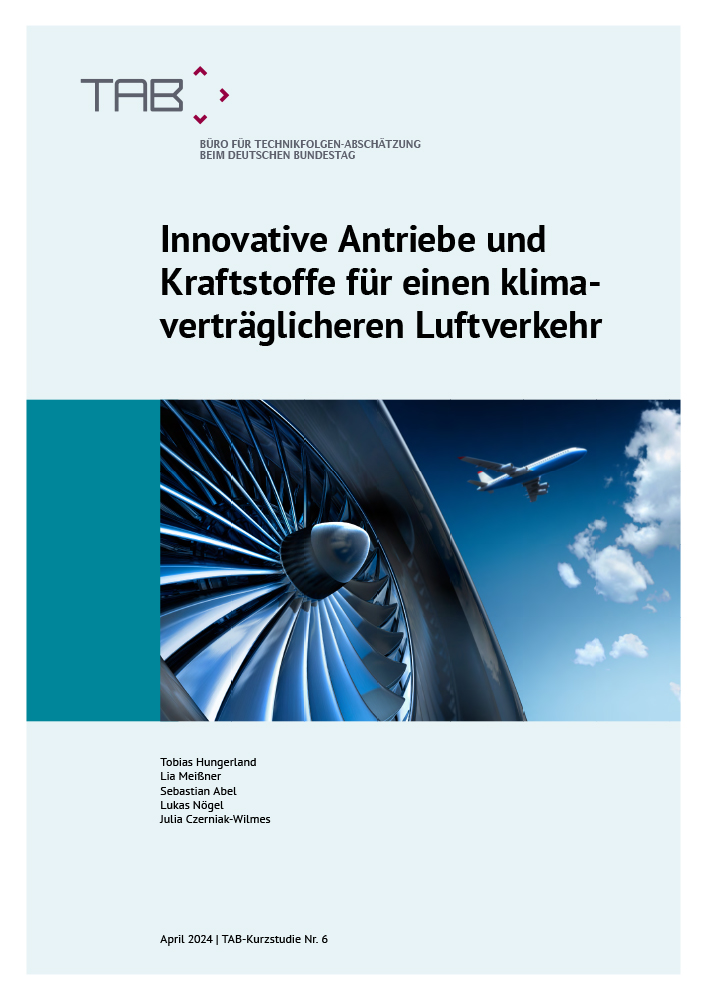
Innovative engines and fuels for more climate-friendly air transport
- Project team:
Tobias Hungerland (Project manager), Sebastian Abel, Dr. Julia Czerniak-Wilmes, Lukas Nögel
- Thematic area:
- Topic initiative:
Committee on Education, Research and Technology Assessment
- Analytical approach:
TA brief study
- Startdate:
2022
- Enddate:
2023
The short study was approved by the Committee on Education, Research and Technology Assessment on 20 March 2024 and was published on May 8th, 2024.
How air transport can become more climate-friendly
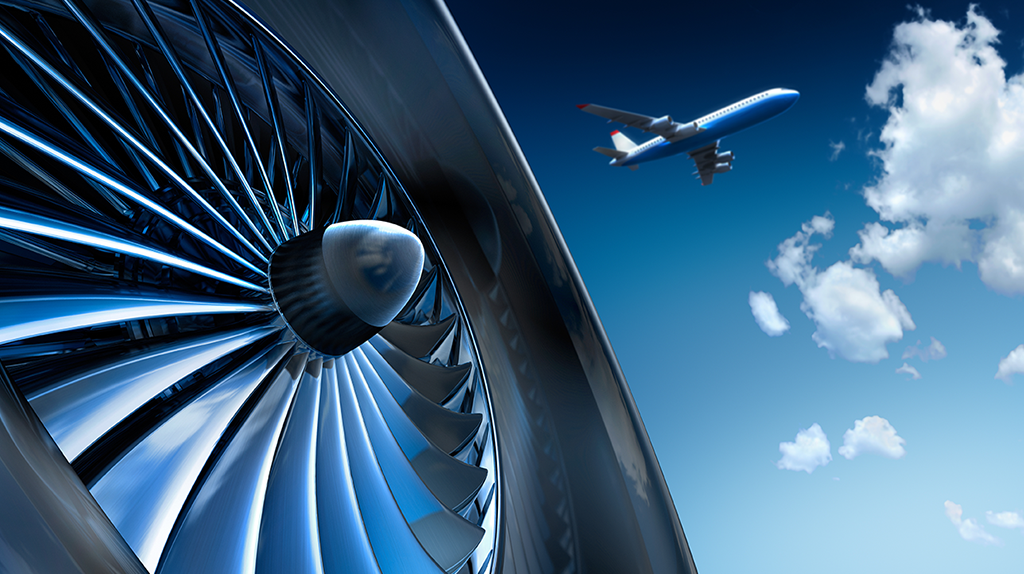
At around 3.5 to 5%, aviation's share of global greenhouse gas emissions is low compared to other modes of transport, but achieving climate neutrality by 2050 is a major challenge given the global growth in air traffic. Against this background, the study "Innovative propulsion systems and fuels for more climate-friendly air transport" provides an overview of key areas of technological innovation that can contribute to more climate-friendly aviation. The focus is on the two innovation areas of fuels and propulsion concepts, which are analysed in terms of their potential and risks. At appropriate points in the analysis, other approaches such as offsetting emissions, increasing efficiency and flight avoidance are also analysed for their potential to make aviation climate neutral. In contrast to carbon-neutral aviation, more climate-friendly aviation does not aim for absolute zero CO2 and non-CO2 emissions.
sprungmarken_marker_3915
Approach
The first chapter defines the conceptual understanding, the analytical framework and the focus of the technology assessment. The introductory chapter also includes a description and outlook on the future development of the climate impact of global aviation. A brief description of the political framework, i.e. the relevant objectives, strategies, measures and regulations, is given as a background against which the two main areas of innovation mentioned can develop and be shaped in the future.
The innovation system of the German aerospace industry with its regional focus and the supporting technology funding provided by the German government are decisive for the development of innovations. The starting point for the analysis of new developments in the two central fields of innovation, fuels and propulsion concepts, is a technology mapping which, on the basis of an analysis of publication and funding data, identifies the focal points of research and development activities in Germany and Europe and outlines their main characteristics. As fuels and propulsion concepts alone will not lead to climate neutrality in aviation, other areas of innovation in aviation are also covered.
A key finding of the study is that a technology mix appears to be necessary to exploit the different potentials of the innovation areas. Building on this insight, social, economic, environmental and political drivers and barriers in the aviation sector are explained. This is followed by an analysis of the strengths and weaknesses of the German aviation innovation system.
Finally, the main fields of action and options for policy-makers to contribute to a climate-neutral aviation sector by promoting the drivers, supporting the strengths, removing the barriers and compensating for the weaknesses are listed.
Current and future developments and the climate impact of aviation
The number of air journeys is increasing worldwide. Achieving climate neutrality is a major challenge, given the global growth in passenger and freight traffic. In addition, developments vary from region to region, with the largest growth in flights occurring in regions of the world with less stringent climate targets.
International aviation is estimated to be responsible for around 3.5 to 5% of anthropogenic warming. In Europe, aviation is responsible for about 4% of total annual greenhouse gas emissions (GHG emissions); in Germany, about 3.4% of total German CO2 emissions are caused by international air traffic to and from Germany and 0.33% by domestic air traffic. Around 1.5% of total man-made CO2 emissions since 1940 are attributable to aviation. However, CO2 accounts for only about one-third of the climate impact of aviation. The non-CO2 effects - soot particles, water vapour, sulphur and nitrogen oxides (NOX), which lead to the formation of contrails and cirrus clouds - play a far more significant role, although they are not yet fully understood scientifically. The effects of condensation trails and cirrus clouds are thought to be the strongest, along with those of CO2. The impact on the climate also varies according to the routes travelled, the altitudes flown and the aircraft used.
Historically, air traffic for both passengers and freight has grown steadily. This trend is likely to continue for the next 25 years or so. Without action, kerosene consumption and climate impact will continue to rise. By 2050, CO2 emissions could be 60% higher than in 2019.
Policy framework
The policy and regulatory framework for reducing the climate change impact of aviation consists of various national and European regulations and policies, as well as international commitments under the International Civil Aviation Organisation (ICAO) and the United Nations Framework Convention on Climate Change (UNFCCC). In particular, current activities at the European level, such as the strengthening of emissions trading or new incentives for the use of sustainable fuels, are important drivers for the further development of this framework. The debate on which policy instruments and approaches are most effective in achieving the most climate-neutral air transport is highly dynamic. It is important to consider whether the focus is primarily on German, European or international aviation. In this context, a large number of research and economic policy strategy and position papers, white papers and technology roadmaps on climate-neutral flying and climate-neutral air transport have been published in recent years by political and economic bodies, think tanks and research institutions. They present possible technological development paths on the one hand, and various political strategies for achieving the most climate-neutral aviation possible on the other.
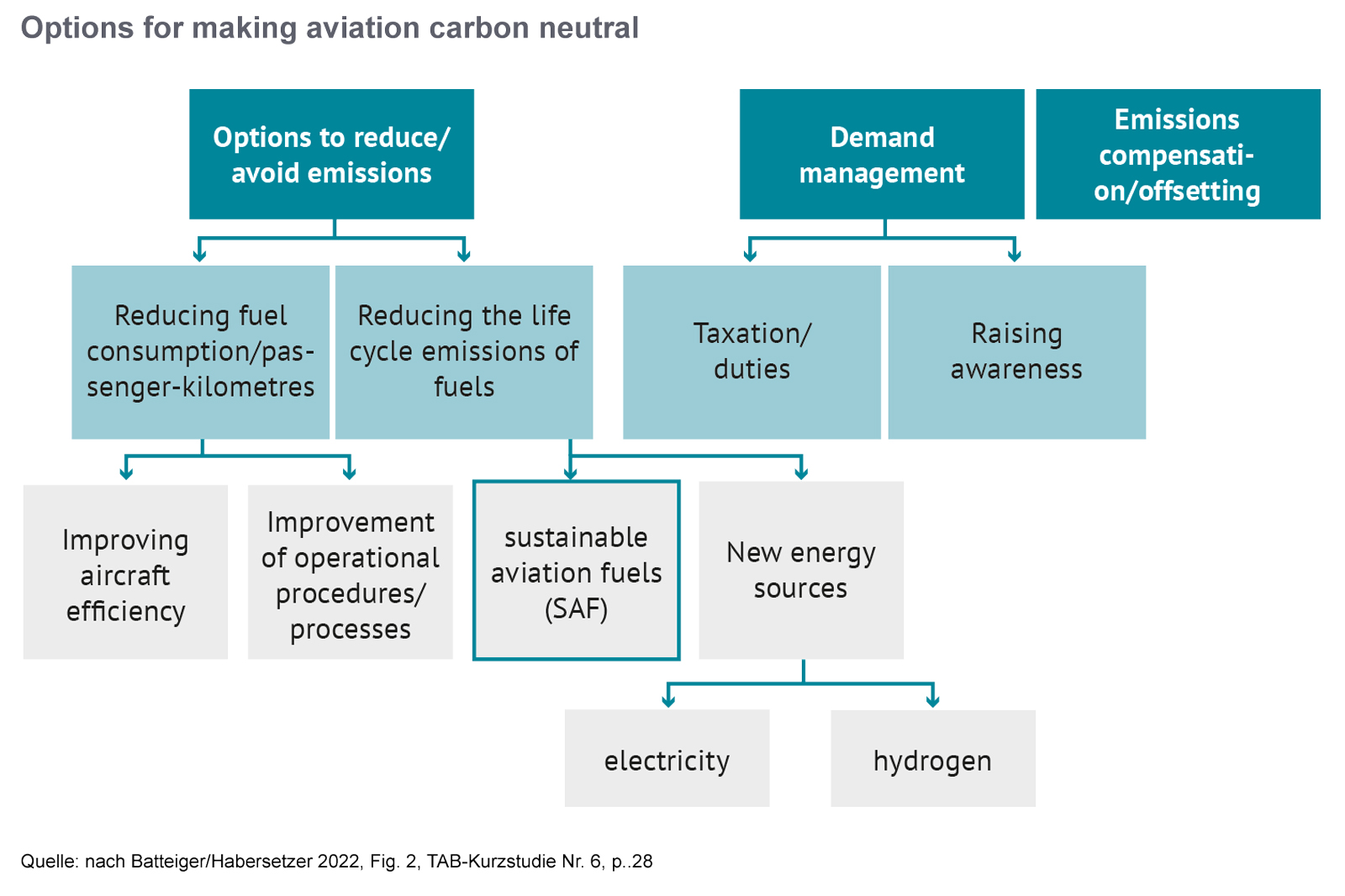
The German aviation innovation system
The aviation innovation system in Germany consists of a large number of nationally and internationally networked actors. Technology funding at federal and state level is a key component of innovation capability. Over time, a diverse innovation ecosystem has developed that covers all stages of the aviation value chain and technology areas. Cluster initiatives play a special role in promoting education/training, R&D activities and the transfer of theory into practice.
The central instrument for promoting research and technology projects in civil aviation in Germany is the Aviation Research Programme (LuFo) of the Federal Ministry of Economics and Climate Protection (BMWK). The aim of this programme is to strengthen the competitiveness of the German aviation industry by promoting technology. Sustainability and the impact on climate protection are given high priority in the selection of funded projects, and in 2020 the programme for the first time set specific targets for 2035. The BMWK's analysis of research funding for civil aviation technology projects alone shows that the level of funding will remain relatively constant at around €150 million from 2016 to 2020 and will increase significantly to around €200 million from 2021. The federal states also play an important role in promoting aviation technology in Germany, as they shape regional economic and innovation policy and thus influence the conditions for the aviation industry as a business location.
In the regions of Germany with a high number of aviation employees, there are several relevant cluster initiatives that bring together regional players from industry, science and politics and initiate cooperative and technology-oriented projects. Clusters therefore play an important role in supporting small and medium-sized enterprises in particular to be innovative and to translate new technological developments in the field of climate-friendly aviation into new products and services.
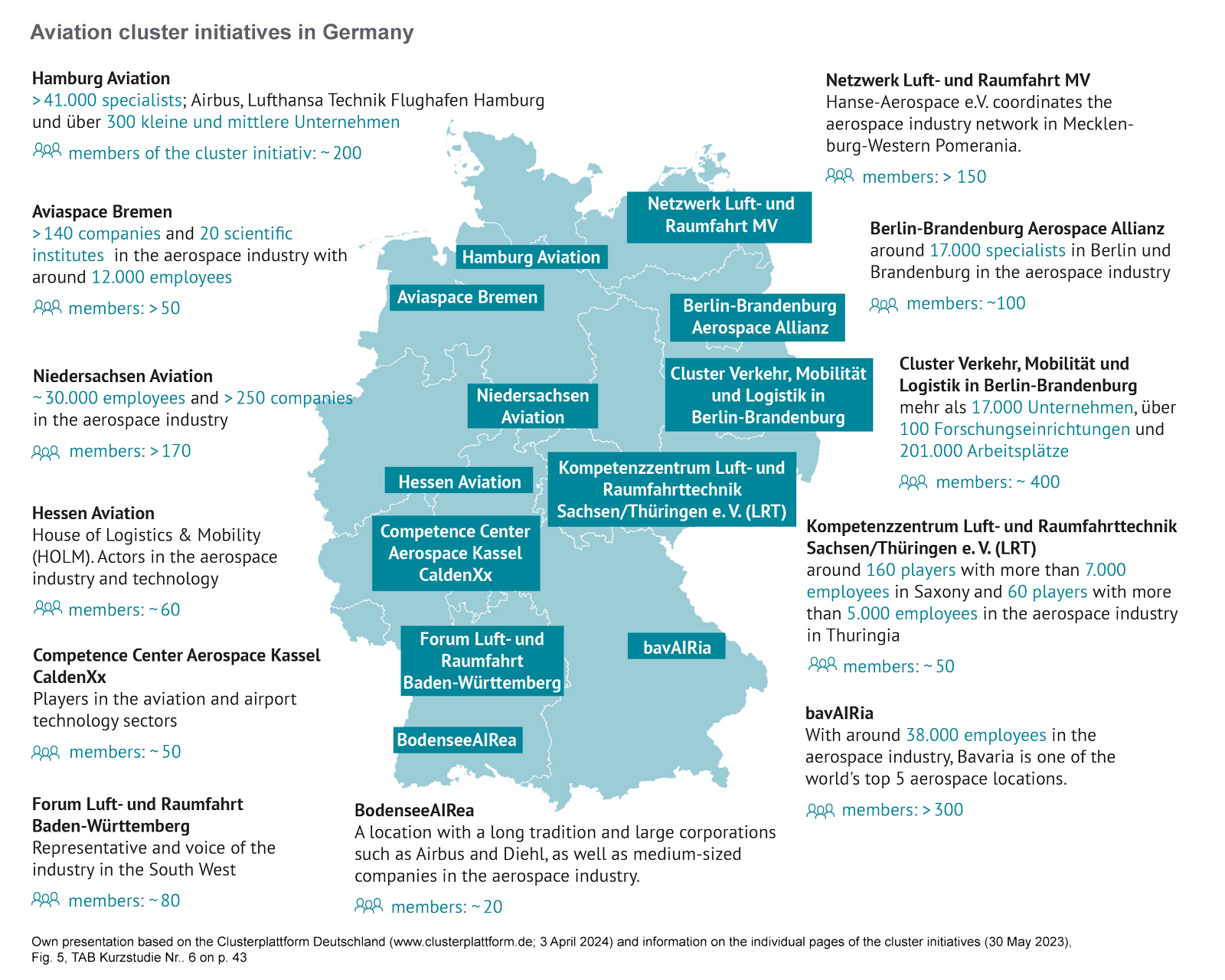
Areas of innovation
The main areas of innovation are in innovative fuels and propulsion concepts. This becomes particularly clear when analysing the international scientific publications and the research projects funded at European level. Electric propulsion, sustainable fuels from waste or biomass, green hydrogen (H2), fuel optimisation, sustainable aircraft design and emission reduction through increased efficiency are the key areas of innovation for a more climate-friendly aviation.
The different areas of innovation are characterised by different technological approaches, although it should be noted that no single technology can be decisive for a climate-neutral aviation. Therefore, innovation areas beyond propulsion concepts and fuels also play an important role.
Sustainable Aviation Fuels (SAFs) are non-petroleum based fuels being developed as alternatives to kerosene to reduce CO2 emissions from aviation and enhance economic, social and environmental sustainability. SAFs can be derived from many resources whose chemical components can be converted into the pure hydrocarbons. As drop-in fuels, SAFs can be blended with or replace existing fuels with little or no modification to aircraft or engine fuel systems, distribution infrastructure or storage facilities. They can be divided into biofuels and electrofuels (e-fuels).
An advantage of biofuels is that their use does not limit the range possible, making them particularly interesting for long-haul flights, and they offer the aviation industry the opportunity to reduce its dependence on fossil fuels. However, the share of biofuels is still very low, so appropriate incentives and long-term policy measures are needed to promote the use of SAF.
The chemical composition of e-fuels is similar to that of fossil fuels such as paraffin. They are produced by electrolysis of water (H2O) to hydrogen and subsequent conversion of the hydrogen with CO2 to synthetic fuels (power-to-liquid process - PtL). Unlike the volume potential of sustainable biofuels for aviation, which is also considered to be limited in the long term, the volume potential of PTL fuels is considered to be sufficient in the long term. A massive additional expansion of renewable energies would be required to meet the electricity needs of both e-fuels and electric aircraft in the long term.
In addition, hydrogen in both gaseous and cryogenic (liquid) form is being researched as an alternative for use in commercial aviation. As this hydrogen is produced by splitting water, most of the associated environmental impacts are related to the type of electricity used.
In addition to efforts to develop more climate-friendly fuels, efforts to develop innovative propulsion concepts are also gaining momentum. An increasing number of prototypes and demonstration projects are being developed and tested to demonstrate the practicality, efficiency and safety of these technologies. Electric (propeller) engines use electric motors powered by batteries. Unlike conventional jet engines, they produce no direct emissions. To date, only a few concepts have been presented for commercial aviation, most of them with low payloads and very limited ranges.
Hydrogen fuel cells convert H2 and oxygen (O2) into H2O and produce electrical energy at the same time. The hydrogen fuel cell can be used either as the sole power source or in combination with other power sources such as electric motors. Hybrid systems combine conventional jet engines with electric motors.
Hybrid propulsion concepts are seen as a compromise solution to some of the outstanding problems of all-electric systems. To some extent, they could provide a bridge between conventional fossil fuels and fully electric or hydrogen powered aircraft.
As turbofan engines are the most widely used propulsion technology in commercial aircraft, efficiency improvements in this area have great potential to make aviation more climate-friendly. The benefits of the propulsion technologies described above include potential reductions in greenhouse gas emissions, diversification of energy sources and noise reduction. There are also a number of technological challenges and barriers to implementation. The propulsion concepts described, such as electric propulsion, hydrogen fuel cells and hybrid propulsion, are still in the development phase.
Optimisation of flight operations also plays a key role. For example, not only could the high fuel costs of e-fuels be mitigated and the specific CO2 emissions per passenger reduced, but the range of aircraft with alternative propulsion concepts could also be extended. Aerodynamic improvements, such as extra smooth surfaces or the use of winglets, can also reduce fuel consumption and increase range.
Another option currently being investigated to reduce overall fuel consumption on long-haul flights is in-flight refuelling. An alternative would be additional refuelling stops.
Optimised flight planning at the airline and air traffic management (ATM) level has the potential to reduce emissions during flights. Operational measures can also make a significant contribution to improving efficiency. These include improved airspace management to avoid diversions, efficient flight procedures such as slower descent, climate-based optimisation of speed and flight profiles, and increased aircraft utilisation. Advanced software and algorithms are used to determine the most efficient flight routes, taking into account factors such as weather conditions, air traffic and fuel consumption.
A wide range of ground equipment is required to ensure smooth airport operations. The electric operation of aircraft tractors, conveyor belts, baggage carts, toilet carts, drinking water carts and feeder taxis, for example, could reduce the environmental impact of aviation. Improvements to airport infrastructure, such as taxiways, runways and terminals, play a crucial role in minimising aircraft idle time and improving traffic flow. This can reduce fuel consumption on the ground, cut emissions and optimise airport capacity.
Digital simulations of aircraft systems (digital twins) help to digitally simulate, predict and optimise the performance of systems in real time, and to virtually test new designs and technologies before physical prototypes are built. This can speed up the development process, reduce resource consumption and enable greener innovations.
Carbon neutral aviation in Germany
Given the current state of the art, the following can be said: None of the strategies considered is sufficient on its own to achieve the emissions targets; instead, a combination of different measures is required, taking into account the respective strengths and weaknesses of the innovations as well as the different areas of application. SAFs represent the most important area of innovation with a short time horizon, as they can already be used in the existing fleet today and can reduce emissions. Hybrid concepts have the potential to be used on regional flights from 2030, on short-haul flights from around 2040 and on medium-haul flights from around 2050. It is likely to be at least 20 to 30 years before the innovations described above are deployed on a significant scale, either because the technologies are not yet fully developed or because the volume potential of the fuels available is not sufficient in the short term.
Drivers and Barriers to Carbon Neutral Aviation
The social drivers and barriers are characterised by a lively social discourse on the environmental consequences, but this has not yet led to a clear change in values and demand for air travel. Rather, demand for air travel is being driven by global population growth, a growing need for mobility and positive trends in prosperity. However, it is currently unclear to what extent the growing demand can be met in the future by the currently rather tight supply. In any case, air fares are likely to rise, so the future development of air transport will depend on the willingness of customers to pay. In addition, the development and introduction of new technologies may raise safety and acceptance concerns. However, reliable evidence on the different areas of innovation is still limited.
Economic drivers and barriers are primarily characterised by the investment environment for realising market potential, the availability of skilled labour, the need for skilled labour and infrastructure development. Although Germany's business and institutional structures can be considered efficient, competition with other industries and sectors for the necessary energy sources is a particular challenge that needs to be addressed. The same applies to the demand for and availability of skilled labour. Although there is generally a very good basis in terms of training opportunities and qualification levels, there is already a shortage of skilled labour, which is likely to become even more acute in the future as a result of competition with other sectors and industries. Finally, it is an economic challenge to build and expand the infrastructure for the production, transport and refuelling of both hydrogen and SAF, and to compete with other sectors and industries for procurement.
On the environmental front, research into the impact of aviation on the atmosphere and climate is particularly important. At present, there are gaps in knowledge, particularly with regard to non-CO2 effects, which make it difficult to develop effective measures to mitigate climate-damaging effects. When considering offsets, it is important to note that they differ from each other and have different effects, including rebound effects, where the possibility of offsets may lead to an increase in air travel.
Public policy can play an important role in making air transport as climate-neutral as possible. In particular, support for the development of the necessary infrastructure and the adaptation of regulations, such as the extension of the European Emissions Trading Scheme (EU ETS), should serve to create a reliable market and investment environment while balancing the interests of the various stakeholders. The aviation sector is characterised by comparatively long development and approval times for new technologies. The development and certification of new aircraft designs or engines is estimated to take up to 15 years, with market penetration taking up to a further 30 years. There is therefore a need for a significant increase in public and private investment in research and development, as well as an acceleration of development cycles and certification procedures. The adaptation of approval and certification procedures and the further development of standards also play an important role in shaping the fields of innovation and creating investment security..
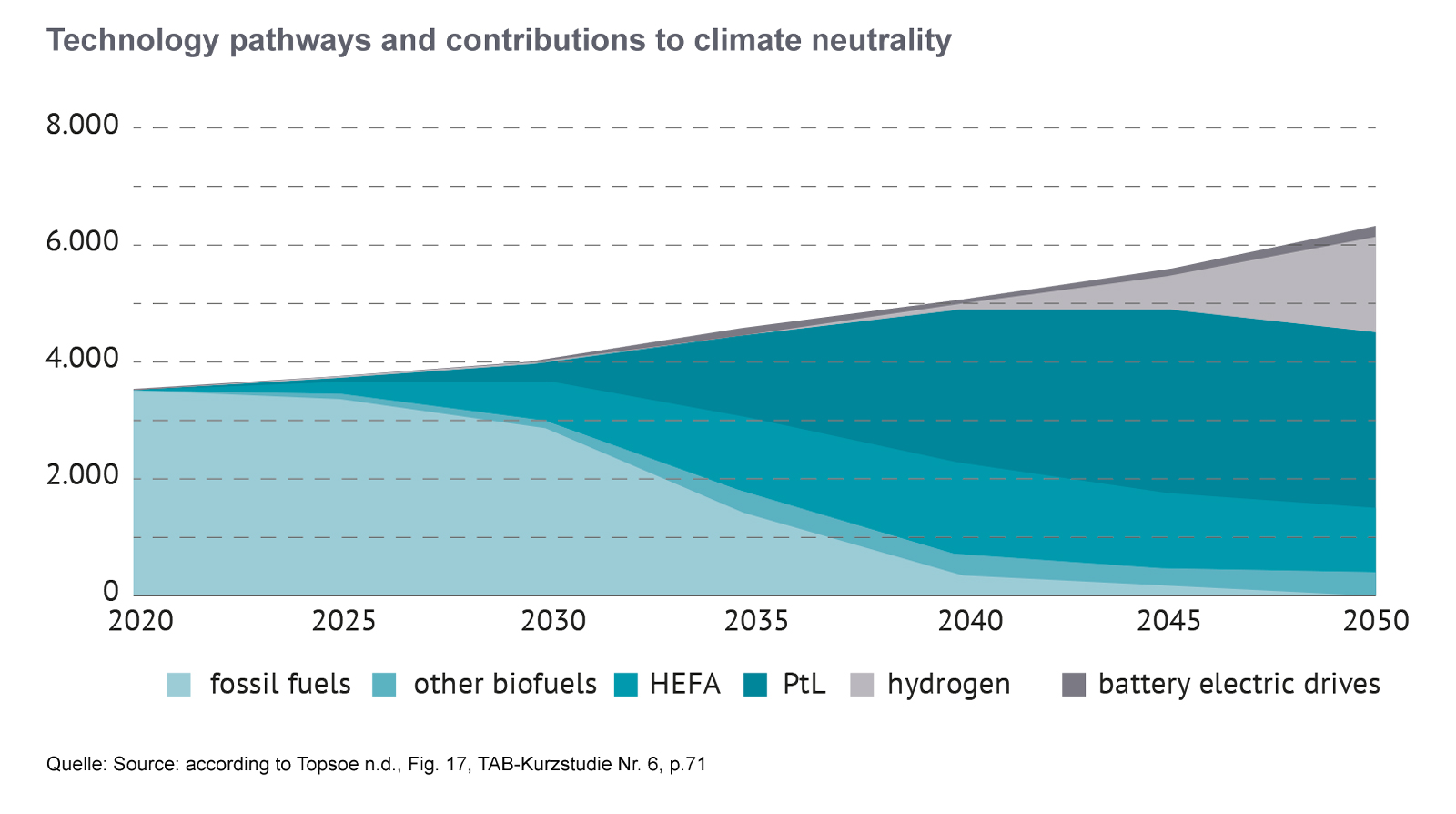
Strengths and weaknesses of the German aviation innovation system
The German aviation innovation system has clear strengths and some weaknesses. The many years of innovation activities have led to the development of an internationally significant innovation ecosystem that covers a large part of the aviation value chain.
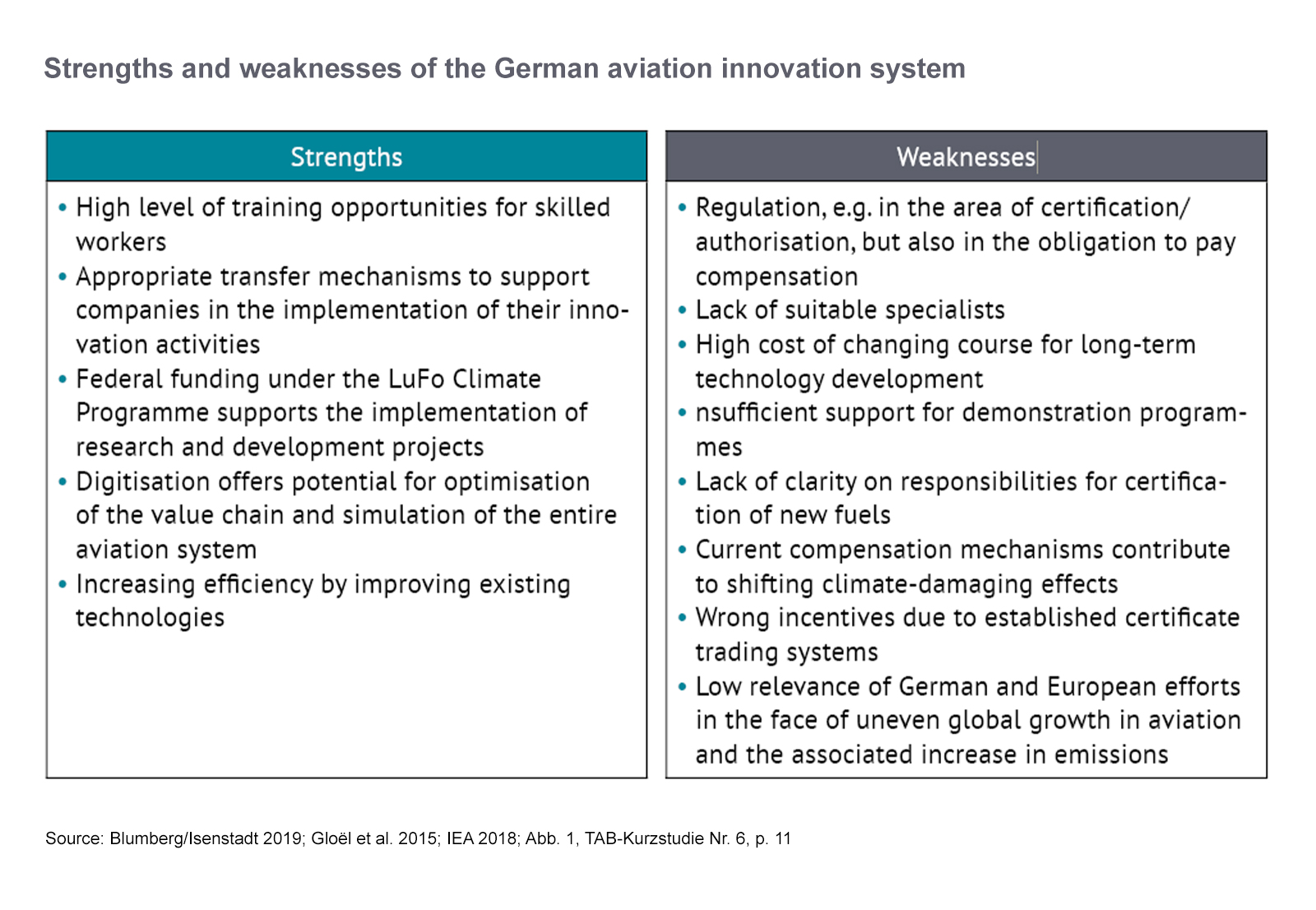
Fields of action
There are various options for making aviation more climate-friendly: those that can be implemented in the very short term and have an immediate impact, and those that can only contribute to climate-neutral aviation in the medium to long term.
Short-term measures
Options to support the increased use of SAF include reducing the proportion of aromatics in kerosene and adjusting taxation.
The use of SAF could be promoted through book and claim schemes, i.e. certificates for the use of SAF that airlines can purchase, thereby making the value and supply chain of SAF sustainable.
Another lever is to adjust the taxation of aviation by levying a kerosene tax. The optimisation of flight routes can also help to reduce emissions through timely permitting.
In the short term, the existing networks of innovation drivers could be maintained and expanded through technology funding, in particular under the LuFo Climate programme.
Particular attention could be paid to the private aircraft segment, especially for short-haul flights. In Germany, the number of flights in this segment, which is associated with a disproportionate share of climate-damaging emissions, has increased significantly. As these aircraft are generally small and used mainly for short-haul flights, this segment lends itself to reducing the harmful effects on the climate through taxation or emissions trading and the introduction of new propulsion concepts, such as battery-powered aircraft engines.
Medium and long-term measures
Design options that are likely to have an impact only in the medium to long term nevertheless need to be implemented in the short term. Particularly in view of the long-term innovation cycles and the time required for the certification of fuels and technical components, it appears necessary to set the course for climate-neutral aviation without delay. The adaptation of standards and norms as well as safety certifications, in particular with a focus on (as yet unapproved) aromatic-free SAFs, can be included in this category. Given the interdependencies between production processes for different variants of SAFs, the potential for sectoral competition in the production and use of hydrogen, and the challenge of scaling up production capacities for green hydrogen, sectoral coupling seems appropriate. This would allow a more equitable distribution of investment costs for the development of sufficient infrastructure.
In the medium term, digitisation has the potential to make aviation and aircraft design and operation more efficient. Adequate support for the development of digital infrastructures in the aeronautics sector can help manufacturers and their suppliers to realise this potential.
In order to better support consumers in choosing more climate-friendly transport alternatives, "climate-friendly labels" could contribute to greater transparency when air travel or routes prove to be more climate-friendly compared to other modes of transport or when comparing different flight route options.
The parallel development of different technologies with unclear enforcement potential requires considerable financial effort. In this respect, careful consideration of the different alternatives by policy makers is needed to create a reliable environment for investment and innovation.
In the media
- wdr.de (17.11.2025), Flugverkehr und Klimaschutz: Was kann die Politik tun? Ein Gespräch mit Tobias Hungerland
- tagesschau.de (23.10.2024), Synthetische Treibstoffe: Erstmals Emissionen beim Fliegen mit E-Fuels gemessen.
- sueddeutsche.de/dpa-meldung (30.09.2024), Industrie soll nachhaltige Flugzeugtreibstoffe erzeugen
- fluter.de (26.09.2024), Jetzt bleib mal auf dem Boden. Airlines versprechen, dass wir bis 2050 klimaneutral fliegen. Kann das gelingen?
- tagesschau.de (24.05.2024), Neuer Bericht: So kann Fliegen "grüner" werden.
- faz.net (17.05.2024), Sind Wissenschaftler legitime Antreiber der Klimawende? FAZ-Wissen-Podcast
- br.de (15.05.2024) Antrieb, Auslastung, Design: Wie kann Fliegen "grüner" werden? (Audiobeitrag 4:22)
- deutschlandfunknova.de (15.05.2024) Fliegen. Bleibt nachhaltiger Kraftstoff reines "Wunschdenken"?
- faz.net (+) (13.05.2024), Wie wir in 30 Jahren fliegen könnten.
- klimareporter.de (09.05.2024) Davongeflogen. Mit technischen Innovationen kann Fliegen klimafreundlicher werden, zeigt ein Bericht des Büros für Technikfolgen-Abschätzung des Bundestags. Doch Klimaneutralität ist so nicht erreichbar.
- www.nd-aktuell.de (09.05.2024), Innovative Antriebe sind im Luftverkehr nicht ausreichend. Forscher warnen, beim Klimaschutz allein auf neue Antriebe zu setzen. Es müsse auch deutlich weniger geflogen werden.
- tagesspiegel.de (09.05.2024) „Verantwortlich ist die Luftfahrt“: Klimaschonender fliegen bis 2050 – das wird wohl schwierig
- deutschlandfunknova.de (09.05.2024) Bald klimaschonenderfliegen? Wird schwierig!
- 3sat.de/nano (08.05.2024) Kondensstreifen sind Klimakiller.
- derstandard.at (08.05.2024), Warum klimaschonendes Fliegen bis 2050 nur schwer erreichbar sein wird.
- deutschlandfunk.de (08.05.2024), Erderwärmung: Die Luftfahrt wird absehbar nicht klimaneutral werden. Interview mit Interview mit Stefan Gössling, School of Business and Economics der Linnéuniversität in Kalmar und Institut für Service Management der Universität Lund.
- spiegel.de (08.05.2024), Klimaschonend fliegen könnte erst in Jahrzehnten möglich sein. Wer viel fliegt, schadet dem Klima – und Fachleute machen kaum Hoffnung auf eine schnelle Lösung. Ein Bericht zeigt, wie schwer sich die Branche mit Innovationen tut und welche Ansätze am vielversprechendsten sind.
- www.fr.de (08.05.2024), Klimaschonender fliegen bis 2050 - es wird schwierig
- sciencemediacenter.de, (08.05.2024) Wie kann der Luftverkehr klimafreundlicher werden? Einschätzungen zum TAB-Bericht von Expertinnen und Experten.

